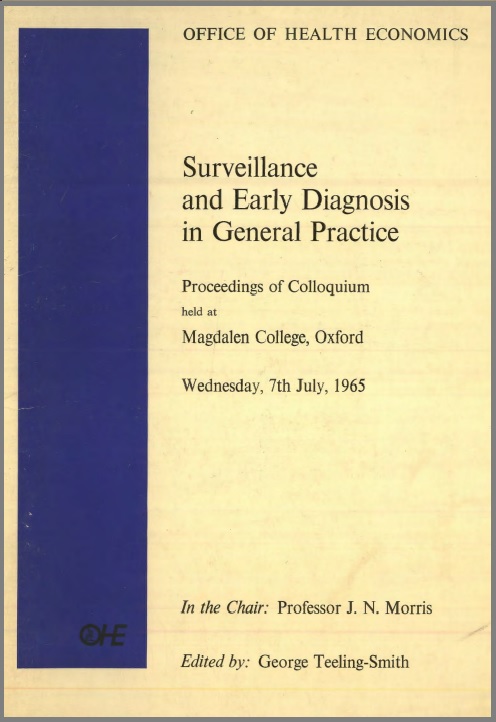Sign up to our newsletter Subscribe
Challenges and Solutions for Budget Impact Analysis of Gene Therapies

Proceedings of Colloquium held at Magdalen College, Oxford, Wednesday, 7th July, 1965
For the purpose of this meeting ‘surveillance’ was defined as describing ‘procedures aimed at the protection of individuals against chronic non-communicable diseases’.
In preliminary discussions, it was clear that there were…
Proceedings of Colloquium held at Magdalen College, Oxford, Wednesday, 7th July, 1965
For the purpose of this meeting ‘surveillance’ was defined as describing ‘procedures aimed at the protection of individuals against chronic non-communicable diseases’.
In preliminary discussions, it was clear that there were two aspects of the subject:
widespread, and possibly automated, screening programmes, which could theoretically be linked to the concept of ‘high risk’ groups with a greater than average likelihood of contracting particular diseases.
the extension of clinical medicine, primarily in general practice, to increase the likelihood of particular diseases being detected, whether the patient as consulted the doctor for that disease or not.
These two aspects were not necessarily distinct. The former had so far received more public attention. The latter might possibly be the more promising short-term approach to achieve the objective defined above.
The programme for the colloquium was drawn up to cover both aspects of the subject. It has been assumed that most participants were to some extent familiar with the stage which early diagnosis and screening, for example in diabetes and glaucoma, had reached in this country. To supplement this, Professor Jungner and Dr Collen were asked to describe briefly their work in Sweden and in the USA.
It was not intended that detailed techniques should be discussed, except in so far as they illustrated general principles. In each session it was hoped that the discussion would throw light on questions such as: Who should have it? Who should do it? Why will they do it? How is it to be organised? What procedures should be used? What are the long-term benefits? What is the cost? Can any list of priorities be given (a) for individual clinical practice and (b) for social policy?
Since the colloquium, the OHE has set up a standing advisory committee, under the chairmanship of Professor R.E. Tunbridge, to consider how some of the ideas suggested during the meeting could be translated into policy and actions in the future.
Surveillance and Early Diagnosis and General Practice
Teeling Smith, G. ed.
(1966) Surveillance and Early Diagnosis and General Practice. OHE Monograph. Available from https://www.ohe.org/publications/surveillance-and-early-diagnosis-and-general-practice/